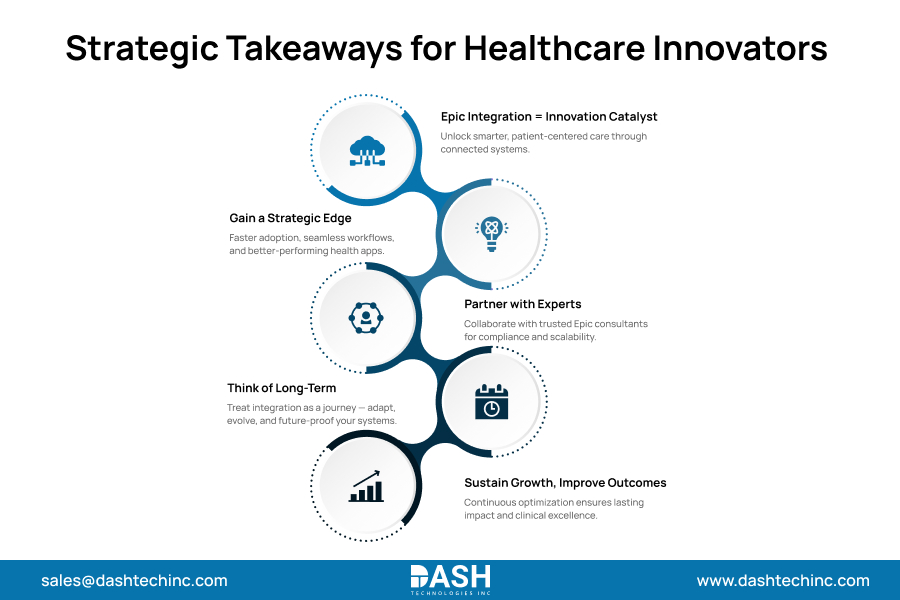Overcoming Common Challenges in Epic EHR Integration for Health Apps
Epic EHR integration improves interoperability, streamlines workflows, and boosts clinical decision-making. Yet, linking health apps with Epic has its challenges. These include tricky data communication, standard compliance, and system compatibility. If not managed well, these issues can slow decisions, add admin tasks, and reduce user adoption.
To overcome these hurdles, MedTech companies should take a structured approach. Using effective strategies helps ensure smooth integration. This helps us share information securely. It also leads to long-term success in digital healthcare.
Why Epic Integration Matters
Healthcare and MedTech firms need Epic EHR integration for essential business functions. Epic is the most used electronic health record system in major healthcare networks. Connecting with Epic lets organizations access vast patient data and clinical workflow tools. This builds interoperability and improves efficiency in operations.
Interoperability plays a key role in healthcare. Epic interoperability solutions help organizations share patient data securely. They also automate workflows and reduce errors from manual tasks. This helps make better clinical decisions. Epic integration services connect health apps and systems. This makes patient experiences smoother and improves care coordination.
Value-based, data-driven care needs Epic integration to work. Providers quickly access up-to-date patient records and analysis tools. This helps improve patient outcomes. Doctors make quick, smart choices while keeping compliance and security rules. Healthcare groups investing in Epic EHR integration see real results. Workflows improve, paperwork decreases, and care quality rises.
Seamless Epic Integration Starts Here
Empower your healthcare systems with secure, connected, and intelligent Epic EHR solutions — driving efficiency, accuracy, and better care delivery.
Talk to Our ExpertsCommon Epic EHR Integration Challenges
Integrating Epic EHR into healthcare systems offers major efficiencies. However, it also creates significant challenges for health organizations. Here are some of the biggest integration issues with Epic EHR. Each affects interoperability, security, scalability, and data accuracy.
Limited API Access
Healthcare companies often face limited APIs and poor documentation. This makes Epic EHR API integration tough. Technical barriers and unclear standards make teams spend extra time on endpoints and compliance.
These limitations slow development, restrict external app connectivity, and complicate workflows. Epic API integration services are essential. However, ongoing Epic updates require partners to stay up to date.
Data Mapping Gaps
Integrating with Epic means reconciling different data models across disparate systems. These data mapping gaps result in synchronization issues, data inconsistencies, and delays. Epic interoperability solutions must address these problems by harmonizing varied data formats to ensure continuous, error-free information flow & reliable patient records.
Without this alignment, they risk syncing delays, data mismatches, and errors affecting patient care. Even the most advanced epic interoperability solution cannot overcome integration challenges if data mapping gaps persist between platforms.
Security and Compliance Risks
Compliance with regulations like HIPAA, HL7, and FHIR introduces extra complexity and obvious costs associated with it. Epic integration implementation requires strict attention to security, audit controls, data encryption, and access restrictions.
Inadequate security practices with missed compliance updates, or integration errors can lead to vulnerabilities and put protected health information (PHI) at risk. That results in expensive violations or breaches and adding to EHR integration challenges.
Scalability and Maintenance Issues
Epic integration projects often run into scalability challenges and maintenance slowdowns. Frequent software updates and version mismatches worsen these issues. This results in ongoing operational problems for healthcare companies. They need to continually optimize their systems. An experienced Epic integration company that uses advanced solutions is essential. It ensures the infrastructure runs smoothly and efficiently as demand rises.
Strategies to Overcome Epic Integration Challenges

Medical facilities and hospital networks hit major technical snags when rolling out Epic EHR platforms. To succeed with these deployments, you need careful planning and smart strategies. They should navigate complexities while keeping daily workflows smooth.
The methods below have proven effective in Epic integration projects with Epic EHR consultancy. They help reduce delays and keep costs in check.
Work with Certified Integration Partners
Challenge: In-house IT crews at most healthcare facilities haven’t worked much with Epic’s specific technical requirements or tough compliance standards. These skill shortages cause missed project milestones and force expensive last-minute fixes right when systems launch.
Solution: When healthcare organizations hire Epic integration experts, they gain access to seasoned professionals. These experts have led numerous Epic rollouts from start to finish. A respected integration company has strong skills in technical design and regulatory compliance. These are areas where most internal teams may struggle. Teaming with a great integration partner helps set up data flows correctly. It also ensures compliance with medical industry rules. Plus, you get direct technical support at every stage of deployment. This team-based method significantly drops project risk levels.
Build Scalable, Future-Ready Frameworks
Challenge: Aging IT systems block medical organizations from meeting modern industry benchmarks. Legacy platforms struggle with rising information demands. This leads to slowdowns and higher maintenance costs.
Solution: Healthcare technology directors need to launch Epic integration solutions for health apps. These apps should feature modular, cloud-based designs. This offers a great interoperability solution that adapts easily when business needs shift or software vendors update their products. Cloud infra allows real-time load balancing & seamless storage expansion, while microservices architectures keep each function modular for easier upgrades and continuous optimization.
Use AI for Intelligent Monitoring
Challenge: Standard monitoring platforms miss small integration glitches until clinical operations start failing. This reactive stance hurts information quality and undermines system reliability.
Solution: Medical organizations benefit from using AI in Epic integration. This helps with automated oversight and can predict breakdowns. Machine learning systems continuously parse logs and identify patterns signaling emerging troubles. These tools address common AI challenges in EHR integration. They catch issues before they impact patient care or productivity. Continuous algorithmic oversight enables preventive upkeep and rapid troubleshooting when problems surface.
Key Insights for Healthcare Innovators

Epic integration is a catalyst for innovation and interoperability. MedTech and healthcare organizations create opportunities for smarter, patient-centered care when they build strong integrations.
Strategic Advantage: Organizations that implement advanced Epic EHR integration services see faster technology adoption rates. Health apps perform effectively in complex clinical environments thanks to these services.
Role of Trusted Partners: Collaborating with the appropriate Epic consulting for health apps, team accelerates implementation, ensuring regulatory compliance and future-proof, scalable solutions.
Long-term Approach: View integration as a long-term journey, and not a one-off project. This approach equips you to adapt and helps you evolve to meet changing requirements, technology updates, and all patient expectations.
Healthcare innovators focused on expert partnerships and dedicated to ongoing optimization efforts will capture Epic EHR integration’s complete value, producing superior clinical outcomes and growth that endures.
Your Trusted Epic Integration Partner
Choosing the right Epic integration partner can make a big difference. It sets apart organizations that struggle with digital transformation from those that succeed. Healthcare and MedTech companies need Epic EHR integration backed by real experience, not just promises. We’ve spent years honing this skill in complex healthcare settings. Our work delivers measurable results for clients.
Measurable Outcomes: Deployment schedules speed up, and data flows smoothly. We fully meet regulatory requirements, and ROI shows in clear numbers. These results transform healthcare operations, leading to better accuracy and stronger strategic capacity.
End-to-End Support: Our involvement starts when you begin planning and continues through final operational launch. As your epic integration company and epic EHR consultancy, we remain committed to client achievement at each stage.
Do you want to improve your Epic EHR integration and extract greater value?
We help healthcare organizations find secure, scalable, and seamless solutions. We build spaces where various systems collaborate. This improves patient care and enhances business performance. Contact us today!
About Dash

Dash Technologies Inc.
We’re technology experts with a passion for bringing concepts to life. By leveraging a unique, consultative process and an agile development approach, we translate business challenges into technology solutions Get in touch.







